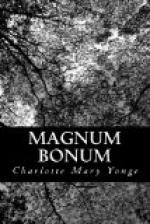The time spent with Fordham was, however, the compensation. There was sincere liking on both sides, and such helpfulness that Fordham more than once wished he had some excuse for making Allen his secretary; and perhaps would have done so if he had really believed such a post would be permanent.
Armine’s term likewise ended, and his examination being over with much credit, he wished for nothing better than to resume the pursuits he had long shared with Fordham. He had not Jock’s facility in forming intimacies with youths of his own age. His development was too exclusively on the spiritual and intellectual side to attract ordinary lads, and his home gave him sufficient interests outside his studies; and thus Fordham was still his sole, as well as his earliest, friend outside the family. Their intercourse had never received the check that circumstances had interposed between others of the two families, Armine had spent part of almost all his vacations with the Evelyns, the correspondence had been a great solace to the invalid, and the friendship grew yearly more equal.
Armine was to join the Evelyn party when they went to the seaside, as they intended to do on leaving London. It was the fashion to say he looked pale and overworked, but he had really attained to very fair health, and was venturing at last to look forward in earnest to a clerical life; a thought that began to colour and deepen all his more intimate conversations with his friend, who could share with him many of the reflections matured in the seclusion of ill-health. For they were truly congenial spirits, and poor Fordham was more experienced in the lore of suffering and resignation than his twenty-seven years seemed to imply.
Meantime, the work of editing the “Traveller’s Joy” was carried on. Some five-and-twenty copies were printed, containing all the favourite papers-a specimen from each contributor, from a shocking bad riddle of Cecil’s to Dr. Medlicott’s commentary upon the myths of the nursery; from Armine’s original acrostic on the “Rhine and Rhone,” down to the “Phantom Blackcock of Kilnaught;” the best illustrations from Mrs. Brownlow’s sketches, and Dr. Medlicott’s clever pen-and-ink outlines were reproduced; and, with much pains and expense, Fordham had procured photographs of all the marked spots, from Schwarenbach even to Fordham Church, so that Cecil and Esther considered it a graceful memorial of their courtship.
“So very kind of Duke,” they said.
Esther had quite forgotten all her dread of him, and never was happier than when he was listening to all that had amused her in the gaieties which she liked much better in the past than in the present.
The whole was finished at last, after many a pleasant discussion and reunion scene, and the books were sent to the binder. Fordham was eager for them to come home, and rather annoyed at some delays which made it doubtful whether they would be received before he, with his mother and sister, were to leave town. It was late, and June had come in, and the weight of London air was oppressing him and making him weaker, and his mother, anxious to get him into sea air, had made no fresh engagements. It was a surprise to meet him at All Saints on St. Peter’s day.




